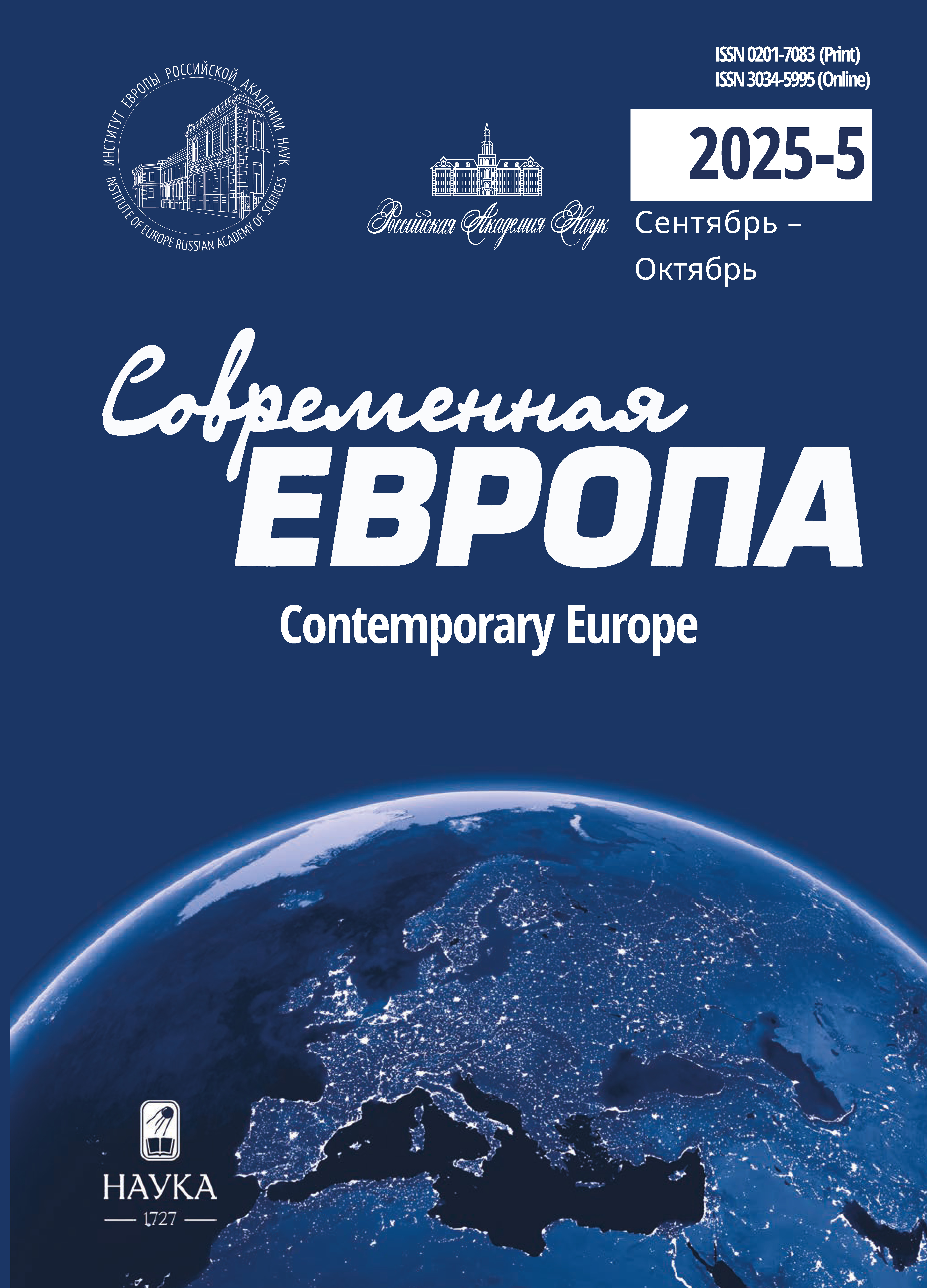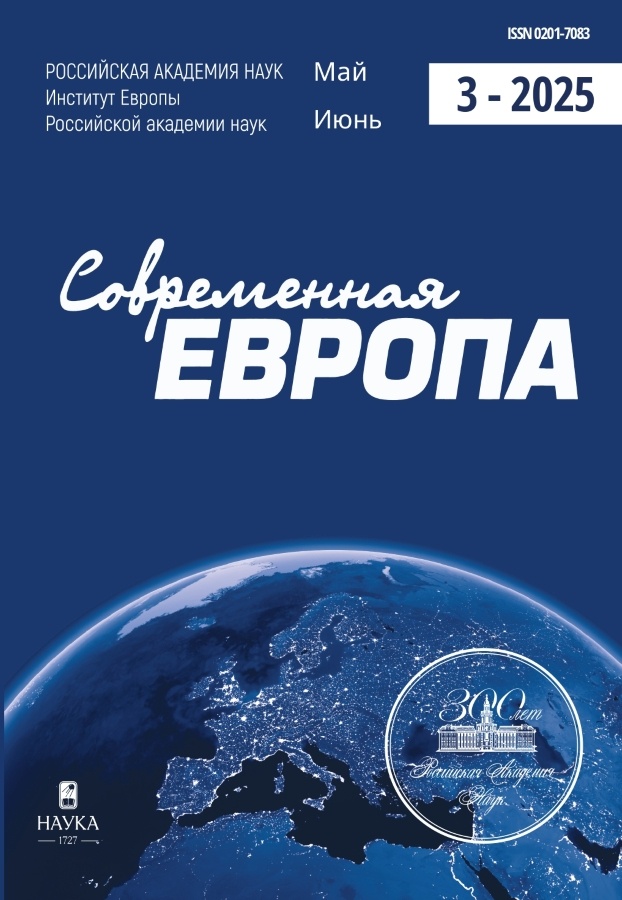Высшее образование как инструмент «мягкой силы»: состояние и вызовы иммиграции (на примере стран Бенилюкса)
- Авторы: Посаженникова А.А1
-
Учреждения:
- Московский государственный институт международных отношений (университет) МИД России
- Выпуск: № 3 (131) (2025)
- Страницы: 135-146
- Раздел: ОБРАЗОВАТЕЛЬНОЕ СОТРУДНИЧЕСТВО
- URL: https://vestnik.nvsu.ru/0201-7083/article/view/689114
- DOI: https://doi.org/10.31857/S0201708325030118
- ID: 689114
Цитировать
Полный текст
Аннотация
В статье рассматривается использование Бельгией, Нидерландами и Люксембургом высшего образования как инструмента укрепления собственной «мягкой силы». Используется интегрированная методология, включающая как концепцию «мягкой силы», позволяющую рассмотреть политику в области высшего образования как инструмент формирования имиджа страны, так и наработки, сделанные исследователями проблематики на стыке сфер высшего образования и иммиграции. Автор проводит сравнение «максимально подобных» кейсов стран Бенилюкс, чтобы показать разницу подходов трех правительств, а также опирается на данные национальной и международной статистики и официальные документы правительств трех стран, приводит показатели рейтингов престижности университетов и «мягкой силы». Сделан вывод об успешном достижении цели, которую страны ставили перед собой в 2000-е гг.: встроить системы высшего образования в контекст глобализации; курсы трех стран в области высшего образования были направлены на создание имиджа инновационных, динамичных стран с сильной экономикой, в первую очередь – на получение экономической выгоды (путем привлечения студентов-будущих высококвалифицированных специалистов). Констатируется наличие разнонаправленных тенденций в области интернационализации высшего образования в регионе. В то же время в Нидерландах происходит отступление от указанной стратегии в пользу приоритета студентам-нидерландцам (путем снижения доли студентов-иностранцев и смены языковой политики в образовании), что связывается с ухудшением общественного отношения к иммигрантам, распространяющегося и на образовательных иммигрантов.
Ключевые слова
Об авторах
А. А Посаженникова
Московский государственный институт международных отношений (университет) МИД России
Email: posnasi@imemo.ru
Преподаватель, кафедра языков стран Северной Европы и Балтии Россия, Москва
Список литературы
- Антюхова Е.А. (2018) Образование как «мягкая сила» в современных зарубежных и российских политологических исследованиях. Вестник Волгоградского государственного университета. Серия 4, История. Регионоведение. Международные отношения. Т. 23. № 4. С. 197–209. DOI: https://doi.org/ 10.15688/jvolsu4.2018.4.17.
- Antyukhova E.A. (2018) Obrazovanie kak “myagkaya sila” v sovremennyh zarubezhnyh i rossijskih politologicheskih issledovaniyah [Education as a soft power in modern foreign and Russian politological research]. Science Journal of Volgograd State University: History ‒ Area Studies ‒ International Relations, 23(4), pp. 197–209. DOI: https://doi.org/ 10.15688/jvolsu4.2018.4.17. (In Russian).
- Лебедева М.М., Харкевич М.В. (2014) «Мягкая сила» России в развитии интеграционных процессов на Евразийском пространстве. Вестник МГИМО-Университета. № 2(35). С. 10‒13. doi: 10.24833/2071-8160-2014-2-35-10-13.
- Lebedeva M.M., Kharkevich M.V. (2014) “Myagkaya sila” Rossii v razvitii integracionnyh processov na Evrazijskom prostranstve [The Role of the Russian Soft Power in Eurasian Integration], MGIMO Review of International Relations, 35(2), pp. 10‒13. doi: 10.24833/2071-81602014-2-35-10-13. (In Russian).
- Невская А.А. (2015) Глобализация и высшее образование в малых странах: пример Нидерландов. Мировая экономика и международные отношения. № 9. С. 46‒56. doi: 10.20542/0131-2227-2015-9-46-56.
- Nevskaya A.A. (2015) Globalizaciya i vysshee obrazovanie v malyh stranah: primer Niderlandov [Impact of Globalization on Small Countries' Higher Education Systems: The Case of the Netherlands], World Eсonomy and International Relations, 9, pp. 46‒56. doi: 10.20542/01312227-2015-9-46-56. (In Russian).
- Торкунов А.В. (2012) Образование как инструмент «мягкой силы» во внешней политике России. Вестник МГИМО-Университета. № 4. С. 86–89. doi: 10.24833/2071-8160-2012-4-25-85-93.
- Torkunov A.V. (2012) Obrazovanie kak instrument “myagkoj sily” vo vneshnej politike Rossii [Education as a Soft Power Tool in Russian Foreign Policy], MGIMO Review of International Relations, 25(4), pp. 85‒93. (In Russian).
- Botonero E.M.R. (2013) EU Higher Education as Soft Power in Neighbouring Countries: A Projection of Influence by Compelling Means. ECPR General Conference Sciences Po, Bordeaux, 4–7 September 2013. Bordeaux. P. 1–28.
- Cerna L., Chou M.H. (2022) Politics of internationalisation and the migration-higher education nexus. Globalisation, Societies and Education. No. 21(2). P. 222–235. doi: 10.1080/14767724.2022.2073975.
- De Witte K. et al. (2020) De economische effecten van internationalisering in het hoger onderwijs. OVER.WERK Tijdschrift van het Steunpunt Werk. No. 2. P. 114‒126. URL: https://www.steunpuntwerk.be/files/publications/OW/OW_2020_2/overwerk_2020_2_14.pdf (accessed: 03.01.2025).
- Draghi M. The future of European competitiveness – In-depth analysis and recommendations. European Commission. 09.09.2024. URL: https://commission.europa.eu/topics/strengtheningeuropeancompetitiveness/eu-competitiveness-looking-ahead_en (accessed: 02.04.2025).
- Gérard M., Sanna A. (2017) Students’ mobility at a glance: efficiency and fairness when brain drain and brain gain are at stake. Journal of international Mobility. No. 5(1). P. 43‒74. doi: 10.3917/jim.005.0043.
- Green H.S. (2016) Top Global Soft Power? Japanese Higher Education and Foreign Policy Goals. Toyohogaku. Vol. 60. No. 1. P. 89–101.
- Harfi M., Mathieu C. (2006) Mobilité internationale et attractivité des étudiants et des chercheurs. Horizons stratégiques, No. 1(1). P. 28‒42. doi: 10.3917/hori.001.0028.
- Knight J. (2012) A Conceptual Framework for the Regionalization of Higher Education: Application to Asia. In: Hawkins J.N., Mok K.H., Neubauer D.E. (Eds.) 2012. Higher Education Regionalization in Asia Pacific. International and Development Education. Palgrave Macmillan, New York, XVI, 215 p. doi: 10.1057/9781137311801_2. P. 17‒35.
- Nye J. (2005) Soft Power: The Means to Success in World Politics. New York: Public Affairs, 208 p.
- Vincent-Lancrin S. (2008) L'enseignement supérieur transnational: un nouvel enjeu stratégique? Critique internationale. No. 39(2). P. 67‒86. doi: 10.3917/crii.039.0067.
- Wojciuk A. (2018) Higher education as a soft power in international relations. In: Watanabe Y. (Ed.) 2018. Handbook of Cultural Security. Edward Elgar Publishing, 512 p. P. 343–360. doi: 10.4337/9781786437747.00025.
Дополнительные файлы











